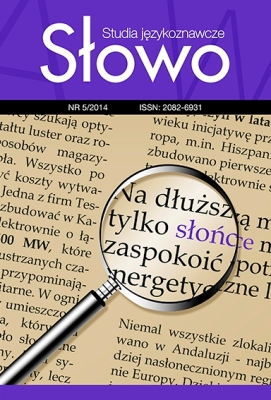Must have - o konsumpcjonizmie w języku i kulturze słów kilka
Abstrakt
Consumption is a feature of individuals but consumptionism characterizes the whole society. The aim of the article is to show the language that creates this phenomenon. The exemplifying material is mainly excerpted from the weblogs and reveals - what sociologists describe - the dreams of social beings about distinguishing oneself in the reality by having a better material status. The article deals with ostentatious consumption while people gather things in order to build their pride and to have other’s admiration or respect to present their life to the others as well. It is also a feature of so called wireless generation – ‘residents of Facebook’.
In the race for material values young people claim that they must possess what the other once have. This reflects the overused English expression included in the title MUST HAVE and its Polish equivalents or synonyms. This kind of language is a tool that leads the human being into the unreal, artificial happiness. Magic words, a fashionable Americanization of Polish language could be appealing but manipulates. The Internet users’ expressions indicate exaggerating of descriptions, empowerment of material issues, tempting by luxury and treat or new and fresh products. These linguistic treatments focus on people that are easily manipulated.
Downloads
Bibliografia
Bauman Z., 2009, Konsumowanie życia, Kraków.
Bogunia-Borowska M., Śleboda M., 2003, Globalizacja i konsumpcja. Dwa dylematy współczesności, Kraków.
Brzozowska B., 2005, Gen X: Pokolenie konsumentów, Kraków.
Hewings M., 1999, Advanced Grammar in Use, Cambridge.
Nitecki A., 2005, Obraz świata konsumpcji w prasie kobiecej. Analiza treści [w:] Konsumpcja – istotny wymiar globalizacji kulturowej, red. A Jawłowska, M. Kempny, Warszawa, s. 197–206.
Ortega y Gasset J., 2008, Bunt mas, tłum. P. Niklewicz, Warszawa.
Polakowska-Kujawa J., red., 2006, Współczesna Europa w procesie zmian: wybrane problemy, Warszawa.
Sitkiewicz K., 2009, Stan pragnienia. Oblicza Mac(k)donaldyzacji, Warszawa.
http://webcache.googleusercontent.com/search?q=cache:TW5O2YrQoagJ:www.ujk.edu.pl/strony/Oleg.Leszczak/peculiarity%252015%2520konsumpcja.doc+&cd=1&hl=pl&ct=clnk&gl=pl – O. Leszczak, 2012, Paradoksy konsumpcjonizmu. Typologia i lingwosemiotyka [w:] „The Peculiarity of Man”, nr 15.
Pobrania
Opublikowane
Jak cytować
Numer
Dział
Licencja
Prawa autorskie (c) 2014 Słowo. Studia językoznawcze

Utwór dostępny jest na licencji Creative Commons Uznanie autorstwa – Użycie niekomercyjne 4.0 Międzynarodowe.


